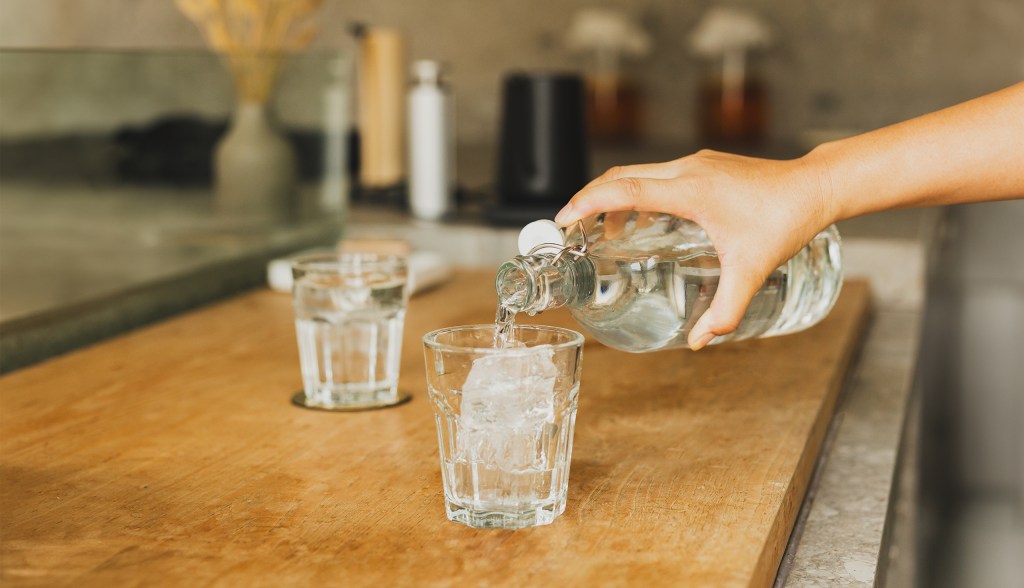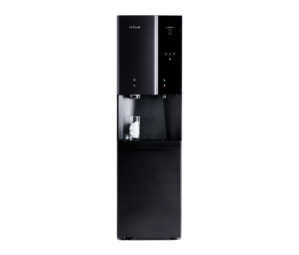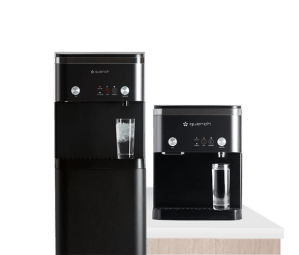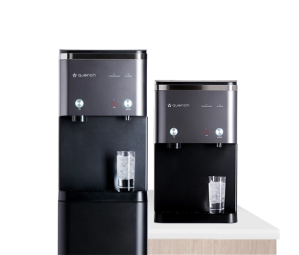
Is Ice Water Bad for You? Understanding the Risks and Benefits
Most people love the crisp, refreshing taste of ice water. But is drinking cold water bad for you? Or is cold water good for you? While some people enjoy cold water without worry, everyone is different. Understanding its advantages and potential drawbacks can help you make the best hydration choices for yourself and your team.
Below, we explore how cold water affects the body and discuss simple ways to keep everyone in your workplace hydrated with clean, sustainable water solutions.
Understanding the effects of cold water on the body
For most healthy people, cold water isn’t harmful and is a good option for staying hydrated throughout the day. However, it can impact people with certain sensitivities or underlying conditions – particularly those related to digestion, circulation and headaches – by triggering or exacerbating symptoms.
Here are a few ways ice water may impact your employees and customers — plus tips on deciding what’s right for you.
Digestion and circulation
Some people believe cold water slows digestion or causes stomach cramps. While ice-cold drinks can momentarily constrict blood vessels, most individuals don’t experience major digestive issues. That said, if you have a sensitive stomach, you might prefer room temperature or warm water.
Cold water may also briefly decrease blood flow as your body works to warm the liquid, which can lead to a slight drop in body temperature. For most of us, this isn’t harmful. However, anyone with circulatory concerns might want to monitor how they feel and choose their water temperature accordingly.
Metabolism and energy levels
You may have heard that drinking cold water burns more calories because the body works to heat it up through a process called thermogenesis. While the effects are minimal, cold water keeps you hydrated and may indirectly help you lose weight by reducing sugar intake and keeping you more satisfied between meals.
Encouraging better hydration
Cold water can be more appealing. When water tastes crisp and refreshing, you’re more likely to drink more. But ultimately, drinking enough water matters more than its temperature. If adding ice to water motivates you and your team to stay hydrated, that’s a win for your bodies.
Health benefits of drinking cold water
Some key health benefits of drinking ice water include:
- Cooling down during exercise or in high temperatures: Cold water helps lower your core temperature and enhances overall endurance and performance. This can be especially helpful during workouts, strenuous physical work or on hot days.
- Supporting an active lifestyle: Whether you’re cycling, running, walking or standing on your feet all day, drinking ice water can help replenish fluids lost through sweat. Adequate hydration also supports muscle function, boosts energy levels and may reduce fatigue.
- Offering slight metabolic boosts: While it doesn’t melt away pounds, cold water prompts the body to use extra energy to regulate temperature. If you’re exploring the benefits of drinking ice water for weight support, it’s more important to maintain consistent hydration, cut down on high-calorie drinks and create healthy habits.
- Improving mood and alertness: A chilled glass of water has an invigorating effect, particularly if you’re feeling sluggish in the afternoon. This can make it a great option for helping employees to stay motivated throughout the day. Proper hydration (no matter the temperature) helps support cognitive function.
Is ice water bad for you? Possible concerns to keep in mind
While ice water is safe and beneficial for most people, there are a few cases where drinking cold water could be bad for you.
Sensitive digestion
Some individuals with gastrointestinal issues may experience bloating or cramping when drinking cold liquids. If that’s you, opting for a slightly cooler or room-temperature drink can help.
Headaches or migraines
If you notice a pattern with ice water and headaches, try cooler (not freezing) water or give your beverage time to warm up a little before sipping.
Respiratory or circulatory issues
People with asthma or other respiratory issues may find cold drinks trigger symptoms. Similarly, those with circulatory challenges should note their body’s response, as cold water can cause minor blood vessel constriction.
If you or someone on your team prefers a gentler hydration option, a combination water and ice machine serves cold or room-temperature water to suit everyone’s preferences.
Best practices for hydration
Is cold water good for you? In most cases, cold water is good for you and can be a refreshing pick-me-up, but the best hydration habits are the ones that feel natural and fit seamlessly into your day. These simple ideas can help make staying hydrated something to look forward to.
Choose the temperature that feels best
Some days, you might crave a cold glass of water. Other times — such as during meals, when you’re feeling unwell or after a long meeting — you might prefer a warmer or room-temperature option. The important thing is to stay hydrated.
Keep water accessible
Having fresh, chilled water within arm’s reach encourages everyone to drink more. A bottle-free water dispenser can be a game-changer in the workplace.
Want to compare different ice machine models? Review our breakdown of commercial ice machines by price and features.
Explore offering alternatives
When encouraging hydration in the workplace, it’s helpful to provide options that fit a variety of preferences. For instance, many of Culligan Quench’s bottleless coolers offer hot, cold, ambient and even sparkling water, all from one machine.
Understand your activity level
If you’re doing high-intensity workouts, performing highly physical work or spending time in hot conditions, cold water isn’t bad for you. In fact, it can help regulate body temperature.
Encourage mindful habits
Hydration is the main goal because it supports productivity and overall wellness. Reminders, refillable bottles and small changes (such as adding fruit or switching to a sleeker cooler) can encourage healthier hydration habits for your entire team.
Avoid dry ice and stick to regular ice
Dry ice is frozen carbon dioxide that can cause burns or release excess gas in enclosed spaces. It’s best to stick with filtered ice cubes from a trusted system, like the Culligan Quench 980-30 water dispenser and ice machine or Culligan Quench 960-965 water dispenser and ice machine.
Common ice water myths vs. reality
Here’s a look at a few common misunderstandings and assumptions about ice water that aren’t necessarily true or based in science:
| Myth | Reality |
|---|---|
| Water slows digestion or causes stomach cramps. | Ice water can momentarily constrict blood vessels, but that doesn’t cause major digestive issues in most people. |
| Drinking cold water helps you lose weight. | While it does burn a few calories heating the water, it’s not enough to significantly impact weight loss. However, drinking water in general can help with weight loss as it can help reduce sugar intake and keep you feeling fuller between meals. |
| Drinking cold water with a hot meal causes an imbalance in the body. | According to Healthline, there isn’t any scientific evidence to prove this. |
Frequently asked questions
Why does ice water hurt my teeth?
Ice water can cause tooth sensitivity and even a painful sensation if the outer layer of your enamel is worn down and the inner layer is exposed. The inner layer of your teeth, called dentin, can be more sensitive to extreme temperatures.
Does ice water cause acid reflux?
In most people, the answer is no. However, drinking cold water can worsen heartburn in people with esophageal issues.
Can headaches be triggered by drinking ice water?
In some cases, drinking very cold water can cause a cold-stimulus headache, also known as “brain freeze,” and can impact migraine sufferers more than others.
Does ice water cause stomach cramps?
Generally, no. There is no evidence to show that drinking ice water causes stomach cramps in healthy people. However, it can cause discomfort in those with some rare health conditions and those team members may prefer to drink warmer water.
Is ice water good after exercise or in hot temperatures?
Yes. Cold water is great after exercise or strenuous physical activity because it helps lower your core body temperature and enhances overall endurance and performance.
Can ice water slow digestion?
Not in most people. While drinking ice water can momentarily constrict blood vessels, it doesn’t typically cause major digestive issues. However, people with a sensitive stomach may prefer room temperature or warm water.
Find the right solution for your workplace
With a wide range of bottleless water coolers dispensing cold water, hot water, ice and even sparkling water, Culligan Quench has the ideal solution for your employees and customers. To get started, explore our product finder or get a free estimate from one of our water experts.
Recommended products
Culligan Quench has an advanced suite of point-of-use systems that are designed to meet the needs of workplaces of all shapes and sizes. Here are some products we recommend for your business.
956 Freestanding Water Dispenser and Ice Machine
44 lbs daily ice production. 13.2 lbs ice storage.

960/965 Water Dispenser and Ice Machine
125 lbs daily ice production. 7 lbs ice storage.

960-16/965-16 Water Dispenser and Ice Machine
165 lbs daily ice production. 16 lbs ice storage.